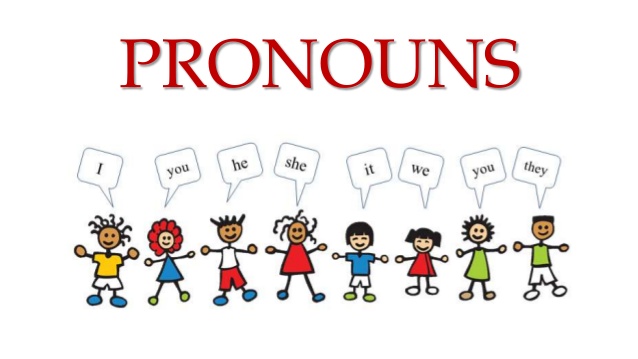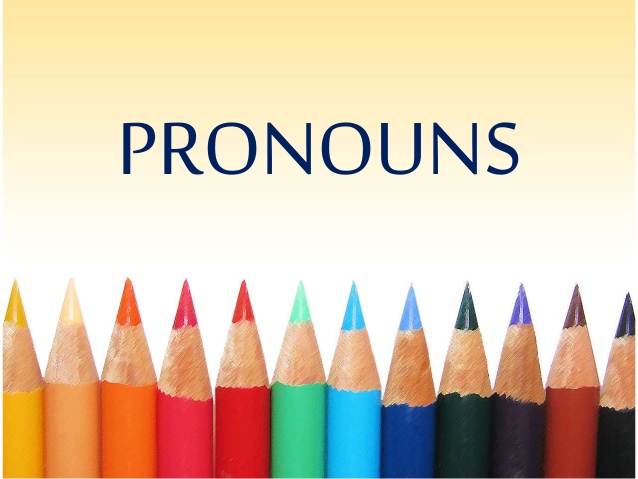Created by Anandita Roy
Types of Pronouns
A pronoun is a word that replaces a noun in a sentence. Using pronouns keeps you from repeating the same nouns over and over again. There are many different types of pronouns, each serving a different purpose. Keep reading for the different types of pronouns that you're likely to encounter in your reading and conversation
Personal Pronouns
Personal pronouns function as a substitute for a person's name. Subject pronouns replace the name of the subject of a sentence, while object pronouns replace the name of the object. The main personal pronouns are:
| Subject Pronouns | I, you, he, she, it, we, they | I don't want to leave. You are a talented artist. They went to the store. |
| Object Pronouns | me, you, her, him, it, us, them | Go talk to her. Has anyone met him? Come sit with us. |
The personal pronouns you use depend on many things, including the context of a sentence and a person's preferred pronouns. Many style guides now have guidance on using they/them as singular pronouns.
Possessive Pronouns
Possessive pronouns show ownership or possession of a noun. They replace a noun that typically has an apostrophe and "s" after it (such as "Bethany's"). There are two types of possessive pronouns: possessive determiners that can function as pronouns, and independent possessive pronouns, which refer to a previously stated noun.
| Possessive Determiners | my, your, our, her, his, its, their | Is that my book? Your dog is so cute. Her job is exciting. |
| Independent Possessive Pronouns | mine, yours, ours, hers, his, its, theirs | That prize is mine. Ours is down the street. The decision is theirs. |
Notice that the possessive determiners always come before a noun, while the independent possessive pronouns can stand alone. The two possessive pronouns that are the same in both cases are his and its — the words are spelled the same no matter how you use them as a pronoun (with no apostrophe in
Indefinite Pronouns
Indefinite pronouns don't point to particular nouns. We use them when an object doesn't need to be specifically identified. There are singular indefinite pronouns that function as singular nouns, and plural indefinite objects that function as plural nouns. There are also some indefinite pronouns that function both ways.
| Singular Indefinite Pronouns | anybody, anyone, anything, each, everybody, everyone, everything, little, much, nobody, no one, nothing, one, somebody, someone, something | Everybody loves it here. Nothing is too hard. One must consider the possibilities. |
| Plural Indefinite Pronouns | both, few, many, several | Both sound good to me. Few have mentioned it. Many offered to help. |
| Singular and Plural Indefinite Pronouns | all, any, more, most, none, some, such | All are welcome. More can fit at the table. Can you bring some? |
Most indefinite pronouns work whether the noun comes before the pronoun or not. However, clarifying the noun in the previous sentence may help with any misunderstandi
Relative Pronouns
Relative pronouns connect a clause or phrase to a noun or pronoun. We often see them when we need to add more information. They also include indefinite relative pronouns, which are relative pronouns with "ever" at the end.
| Relative Pronouns | who, whom, which, whose, that | Find the man who stole the money. The dog, which barked all night, is asleep. I sold the watch that my sister gave me. |
| Indefinite Relative Pronouns | whoever, whomever, whichever, whatever | Thank whoever sent a gift. Whichever you choose will be great. We should take whatever train comes next. |
You can use relative pronouns to introduce adjective clauses. They connect dependent clauses to independent clauses to create a more thorough sentence.
Interrogative Pronouns
Interrogative pronouns have the same form as relative pronouns, but they ask a question. Some people confuse interrogative pronouns with interrogative determiners, which come before a noun. However, like all pronouns, interrogative pronouns must replace a noun.
| Interrogative Pronouns | who, whom, which, what, whose | Who is absent? Which is cheaper? Whose is this? |
| Other Interrogative Pronouns | whoever, whomever, whichever, whatever | Whomever should I call? Whichever did you want? Whatever do you mean? |
It may seem like there are words missing from this list, such as where and why. However, they are not interrogative pronouns — they are adverbs that describe more about ver
Reflexive Pronouns
Reflexive pronouns replace the object of a sentence when it refers to the same person or item in the subject. They usually follow the verb in the sentence, but can also follow a preposition. These pronouns end in -self (singular reflexive pronouns) or -selves (plural reflexive pronouns).
| Singular Reflexive Pronouns | myself, yourself, himself, herself, itself, themself, theirself | You should buy yourself a smoothie. Nadine taught herself Spanish. The spider spun a web for itself. |
| Plural Reflexive Pronouns | yourselves, ourselves, themselves | Enjoy yourselves at the party. We gave ourselves plenty of extra time. The kids made themselves a fort. |
If you replace these pronouns with the nouns in the sentence, they are still correct, but they're more awkward. "Nadine taught Nadine Spanish" is more confusing to read than "Nadine taught herself Spanish."
Intensive Pronouns
Intensive pronouns, also known as emphatic pronouns, emphasize or intensify nouns and pronouns. They take the same form as reflexive pronouns, but unlike reflexive pronouns, they're not essential to the sentence. You usually find them right after the noun they're intensifying.
| Singular Intensive Pronouns | myself, yourself, himself, herself, itself, themself, theirself | I myself like to travel. He himself is his worst critic. She herself bought the tickets. |
| Plural Intensive Pronouns | yourselves, ourselves, themselves | You told me you were there yourselves. We finished the project ourselves. They themselves witnessed the crime. |
If you remove intensive pronouns from the sentence, it still makes sense. However, intensive pronouns help to emphasize the important part of the sentence, so they are still helpful to inclu
Demonstrative Pronouns
Demonstrative pronouns take the place of a noun that's already been mentioned. Demonstrative pronouns can be singular or plural. There are five of them, and they can also function as demonstrative adjectives.
| Singular Demonstrative Pronouns | this, that, such, none, neither | This is my favorite song. That doesn't matter. Neither fits me. |
| Plural Demonstrative Pronouns | these, those | These are delicious. Those are too expensive. |
Demonstrative pronouns can also function as demonstrative adjectives. For example, in the sentence "Neither fits me," neither is functioning as a pronoun. If you add a noun into the sentence, such as "Neither dress fits me," neither now functions as an adjective that describes the dress
Reciprocal Pronouns
Reciprocal pronouns show an action that two or more nouns are performing together. There are only two reciprocal pronouns, but they play a big role in English. They also aren't used in the same way.
| Reciprocal Pronoun for Two Nouns | each other | My parents love each other. We gave each other gifts. |
| Reciprocal Pronoun for Three or More Nouns | one another | Respect one another in this classroom. The cats fought one another for the food. |
Punctuating reciprocal pronouns can be tricky for some people. When you're using each other or one another as a possessive pronoun (as in "We opened each other's presents"), treat it as a singular noun and add an apostrophe and "s," not an "s" and apostrophe as you would with a plural possessive noun.
PracticingYour Pronouns
Now that you know all the different types of pronouns, practice using them! Check out these helpful resources for reinforcing pronoun skills in your writing.
- Use several pronoun worksheets for all grade levels to work on different kinds of pronouns.
- See if you can tell the difference between pronouns with these types of pronoun worksheets.
- Practice forming and identifying demonstrative pronouns.
- Bring thesepronoun games with no prep work into the classroom.
- Clarify who owns what with a collection of possessive pronoun worksheets.
- Learn more about indefinite pronouns with these exercises on indefinite pronouns.
- Challenge yourself with a pronoun quiz.
- Use these classroom pronoun activities to make grammar fun!Pronouns are multi-taskers, working busily to point us in different directions. They free us from the catastrophe of repeated nouns. Learn more about the different parts of speech in your writing journey. You can also practice your noun know-how with a helpful.
- Post a comment




No comments:
Post a Comment